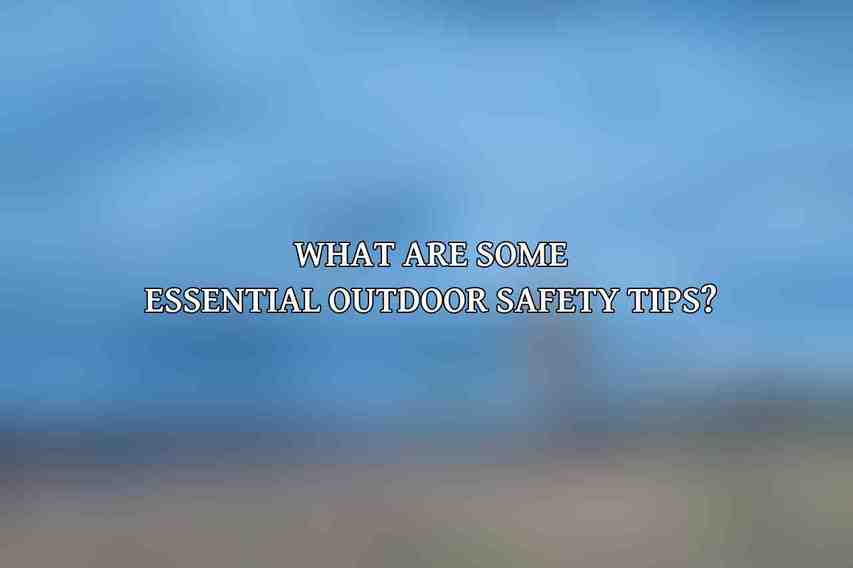Before embarking on any outdoor adventure, proper preparation is key to ensuring a safe and enjoyable experience. Here are some essential tips to consider:
a. Plan Your Route:i. Research the area thoroughly, including weather patterns, terrain, and potential wildlife encounters to have a better understanding of what to expect.ii. It is crucial to inform a trusted individual of your itinerary and expected return time in case of any emergencies.
b. Choose Appropriate Gear:i. Dressing in layers allows you to adjust to changing temperatures throughout your journey.ii. Opt for sturdy, waterproof hiking boots with ankle support to prevent injuries.iii. Pack essential items such as a backpack, water bottle, first-aid kit, flashlight, and map for navigation.iv. Consider investing in a personal locator beacon (PLB) or satellite communicator for emergency situations. Dive deeper into Best Waterproof Safety Gear for Adventurers: Stay Dry & Secure
c. Stay Informed:i. Always check weather forecasts and avoid venturing out in severe conditions that could jeopardize your safety.ii. Be well-aware of the local wildlife in the area and understand the potential dangers they may pose, ensuring you take necessary precautions.
Hiking Safety:
When hitting the trails, it’s crucial to prioritize safety to prevent any mishaps. Here are some hiking safety tips to keep in mind:
a. Stick to Designated Trails:i. Avoid taking shortcuts or venturing onto unmarked paths to minimize the risk of getting lost.ii. Stay within designated trail boundaries to ensure your safety and preserve the natural habitat.
b. Be Aware of Wildlife:i. Making noise while hiking can help alert wildlife to your presence, reducing the chances of surprising them.ii. Carry bear spray and familiarize yourself with how to use it properly to deter potential wildlife encounters.iii. Remember to avoid approaching wild animals, especially bears and moose, to prevent confrontations. Dive deeper into Top Bear Sprays Reviewed: Ultimate Protection in the Wild
c. Stay on the Lookout:i. Continuously scan your surroundings for any obstacles, hazards, or potential dangers that may impede your journey.ii. Utilize walking poles not only for stability but also to clear away vegetation that may obstruct your path.
d. Avoid Hiking Alone:i. Safety in numbers is crucial when hiking, so always try to venture with a companion rather than going solo.ii. Share your planned location and route with someone reliable, enhancing safety measures in case of any unforeseen circumstances.
Camping Safety:
But it’s essential to prioritize safety in your outdoor accommodations. here’s how you can ensure a safe camping trip:
a. Choose a Safe Campsite:i. Look for level ground that is away from water sources and steep terrain to prevent accidents during your stay.ii. Avoid camping in areas with dead trees or loose rocks that may pose a danger to your safety.
b. Set Up Camp Properly:i. Securely pitch your tent to withstand varying weather conditions, such as strong winds or rainfall.ii. Properly store food and trash in airtight containers to prevent attracting wildlife to your campsite.
c. Manage Fire Safety:i. Only build campfires in designated fire pits to minimize the risk of uncontrolled wildfires.ii. Ensure fires are fully extinguished before leaving your campsite to prevent any potential hazards.
d. Be Aware of Bears:i. Keep food and scented items safely stored in bear canisters to avoid attracting unwanted wildlife to your camp.ii. Make loud noises and avoid leaving food unattended, reducing the likelihood of encountering bears or other wildlife.
Stay tuned for more insights on water safety, wilderness survival techniques, first aid, and emergency preparedness in the following sections! Learn more about Essential Survival Tools Every Adventurer Needs
Frequently Asked Questions
What are some essential outdoor safety tips?

Some essential outdoor safety tips include informing someone of your plans before heading out, packing necessary supplies including a first aid kit and plenty of water, staying aware of your surroundings, and knowing your limits.
How can I stay safe while hiking in the wild?

To stay safe while hiking in the wild, make sure to stay on marked trails, be aware of wildlife in the area, carry a map and compass, and be prepared for changing weather conditions.
What should I do if I encounter wildlife while outdoors?
If you encounter wildlife while outdoors, remain calm and do not approach the animal. Give the animal space to move away and slowly back away yourself. Avoid sudden movements or making loud noises.
Why is it important to stay hydrated while outdoors?
Staying hydrated is important while outdoors to prevent dehydration, heat exhaustion, and heat stroke. Dehydration can lead to a variety of health issues and can be dangerous, especially in the wilderness.
What should I do if I get lost while hiking or camping?
If you get lost while hiking or camping, try to stay calm and stay put if possible. Use a whistle or other signaling device to make noise, and stay in one place so rescuers can find you more easily.

